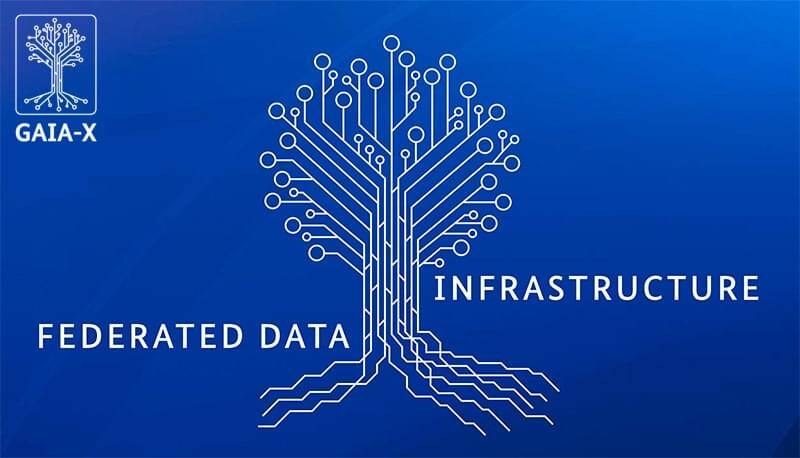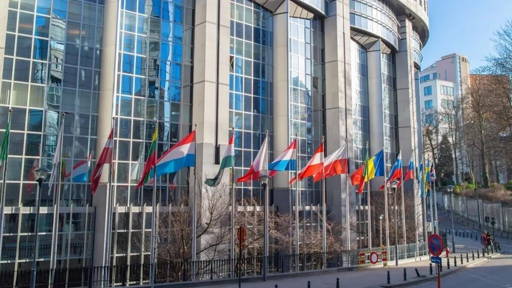GAIA-X is a pan-European project initiated by France and Germany to develop a federation of infrastructure and service providers for digital data exchange in Europe.
The Franco-German project supported by the German Federal Ministry of Economic Affairs and Energy (BMWi) and the French Ministry of Economy and Finance (MINEFI) was first presented at the Digital Summit in October 2019.
Established as a non-profit organization based in Belgium, GAIA-X AISBL aims to create the common requirements for an open, transparent digital ecosystem where data and services can be shared, exchanged and accessed in a trust-based environment. The idea is to prepare the ground for an ecosystem that enables data sharing between business, science and non-profit organizations, based on European values of transparency, openness, data protection and security.
Objectives
GAIA-X connects various elements of the digital infrastructure using open interfaces and standards to allow data sharing, making it available to a wide range of trusted audiences representing business, academia and non-profit organizations. GAIA-X is thus expected to enable various types of innovation platforms.
“Europe makes extensive investments in digital technologies and innovative business models. We must ensure that those who drive innovations forward are also those who benefit in economic terms. This will help to secure value creation and employment in Europe,” according to the project brief. It is a fact that European businesses need an open digital ecosystem to compete globally—an ecosystem that enables both digital sovereignty for cloud users and scalability for European cloud providers. Europe must catch up in this field. Otherwise, the old continent will lag far behind the digitization leaders, namely the USA and China. It’s not just about the digital race, though, but also economic growth, jobs, innovation and, ultimately, social well-being.
 National hubs
GAIA-X is intended to be a data infrastructure ecosystem across Europe. Therefore the project consolidates the already functioning initiatives in the EU Member States within its network. These will form the nucleus of the GAIA-X hubs. Such types have already been established in France, Germany, the Netherlands, Finland, Sweden, Belgium, Luxembourg, Slovenia, Austria and Italy. More are already forming in other countries.
The purpose of the national hubs is to develop local ecosystems, connect national initiatives, and provide a central point of contact for stakeholders in their countries. In addition, the activities of all GAIA-X hubs are to be coordinated to ensure international compatibility in their operation, definition of requirements, and identification of regulatory obstacles. A GAIA-X hub network thus established should then support ecosystem development through a “bottom-up” approach, i.e. from the national to the European level.
As intended, the hubs:
National hubs
GAIA-X is intended to be a data infrastructure ecosystem across Europe. Therefore the project consolidates the already functioning initiatives in the EU Member States within its network. These will form the nucleus of the GAIA-X hubs. Such types have already been established in France, Germany, the Netherlands, Finland, Sweden, Belgium, Luxembourg, Slovenia, Austria and Italy. More are already forming in other countries.
The purpose of the national hubs is to develop local ecosystems, connect national initiatives, and provide a central point of contact for stakeholders in their countries. In addition, the activities of all GAIA-X hubs are to be coordinated to ensure international compatibility in their operation, definition of requirements, and identification of regulatory obstacles. A GAIA-X hub network thus established should then support ecosystem development through a “bottom-up” approach, i.e. from the national to the European level.
As intended, the hubs:
 National hubs
GAIA-X is intended to be a data infrastructure ecosystem across Europe. Therefore the project consolidates the already functioning initiatives in the EU Member States within its network. These will form the nucleus of the GAIA-X hubs. Such types have already been established in France, Germany, the Netherlands, Finland, Sweden, Belgium, Luxembourg, Slovenia, Austria and Italy. More are already forming in other countries.
The purpose of the national hubs is to develop local ecosystems, connect national initiatives, and provide a central point of contact for stakeholders in their countries. In addition, the activities of all GAIA-X hubs are to be coordinated to ensure international compatibility in their operation, definition of requirements, and identification of regulatory obstacles. A GAIA-X hub network thus established should then support ecosystem development through a “bottom-up” approach, i.e. from the national to the European level.
As intended, the hubs:
National hubs
GAIA-X is intended to be a data infrastructure ecosystem across Europe. Therefore the project consolidates the already functioning initiatives in the EU Member States within its network. These will form the nucleus of the GAIA-X hubs. Such types have already been established in France, Germany, the Netherlands, Finland, Sweden, Belgium, Luxembourg, Slovenia, Austria and Italy. More are already forming in other countries.
The purpose of the national hubs is to develop local ecosystems, connect national initiatives, and provide a central point of contact for stakeholders in their countries. In addition, the activities of all GAIA-X hubs are to be coordinated to ensure international compatibility in their operation, definition of requirements, and identification of regulatory obstacles. A GAIA-X hub network thus established should then support ecosystem development through a “bottom-up” approach, i.e. from the national to the European level.
As intended, the hubs:
- serve as national contact points in the country concerned;
- connect initiatives that share the same goals and visions as GAIA-X;
- consolidate regional communities of experts;
- contribute to the European Data Strategy objectives, particularly towards the development of European Data Spaces.






